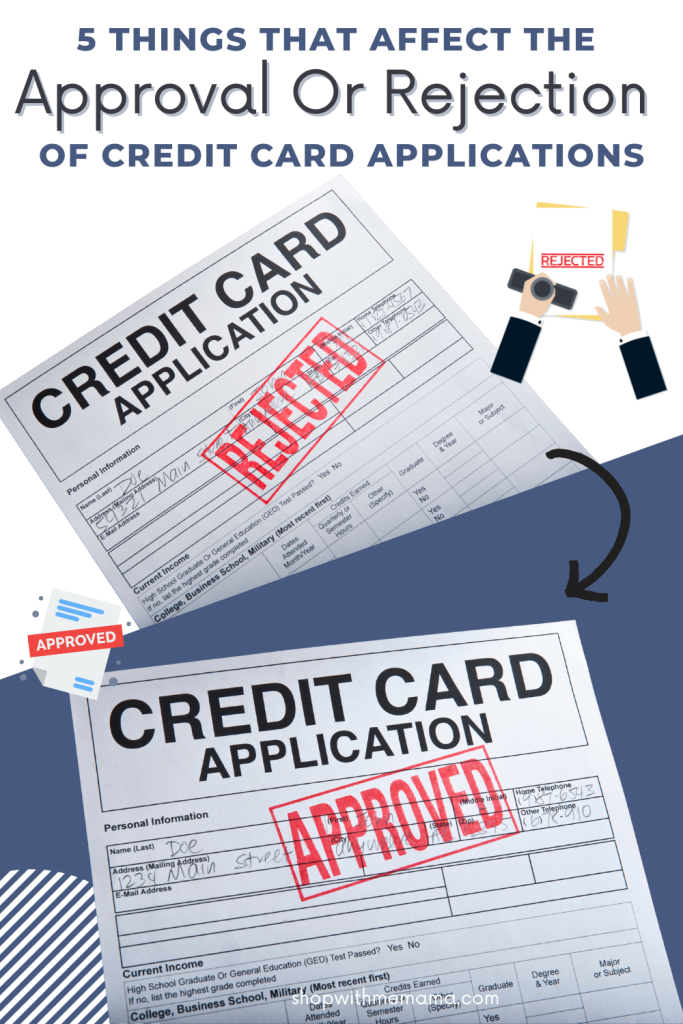I wanted to talk about something really important today. It is 5 things to affect the approval or rejection of credit card applications. Credit cards have become indispensable financial tools in the modern world, offering convenience, security, and rewards for everyday transactions.
From earning cashback to managing emergency expenses, the right credit card can unlock a range of benefits that make life simpler and more rewarding. It is therefore no surprise that more and more people are applying to take advantage of these perks.
However, getting approved for a credit card is not as simple as filling out an application and having a high credit score. While a strong score is pretty important, it is just one piece of the puzzle. Lenders look at a range of factors to assess your financial reliability, many of which are often overlooked by applicants.

5 Things That Affect the Approval Or Rejection of Credit Card Applications
This article dives into the important factors that influence whether your credit card application is likely to be approved (or rejected), helping you navigate the process with confidence and preparation.
Income and Employment Stability
When it comes to approving credit card applications, lenders prioritize one key question: Can you afford to repay what you borrow?
Your income and employment stability are critical indicators of your financial capacity, and issuers rely on these factors to assess your reliability as a payer.
Whether you are a salaried employee, a small business owner, or a freelancer, providing accurate and verifiable proof of income is non-negotiable.
Additionally, consistent employment or a steady source of income strengthens your case, signaling that you have the financial means to handle credit responsibly.
To improve your chances, make sure your application includes up-to-date and well-documented proof of income. Copies of your pay slips, income tax returns, or a certificate of employment can demonstrate your ability to meet repayment obligations.
If you are self-employed, clear financial statements or bank records are essential. By presenting a stable financial profile, you reassure lenders that you are a low-risk borrower.
Debt-to-Income Ratio
Even with a high income, lenders need to ensure that you’re not financially overextended. This is where the debt-to-income (DTI) ratio comes into play.
Your DTI ratio compares your monthly debt payments to your monthly income, giving issuers a clear picture of how much of your income is already tied up in existing obligations. A lower DTI is better, as it indicates that you have enough room to handle additional credit responsibly.
To keep your DTI ratio in check, aim to pay down existing debts before applying for a new credit card. If your ratio is creeping too high, consider strategies like consolidating loans or reducing discretionary spending to free up more income.
More importantly, you should monitor your DTI yourself. Even if you have a strong credit score, you can still face rejections if your DTI suggests you are carrying more debt than you can comfortably manage.
Credit History and Utilization
Another factor that lenders pay attention to is your credit history, focusing on how long you have held credit accounts and your repayment behavior.
A longer history with timely payments reflects positively on your application, showing that you are a reliable and consistent customer. This information helps lenders evaluate your overall creditworthiness beyond just your score.
Additionally, issuers will examine your credit utilization ratio or how much of your available credit you are currently using.
Remember that a high utilization rate can indicate financial strain, even if you have never missed a payment. As such, it is prudent to keep your utilization below 30% of your credit limit and avoid maxing out your accounts to improve your chances of credit card approval.
Likewise, building a diverse credit profile and demonstrating responsible usage over time will make your application more appealing to lenders.
Application Information Accuracy
A strong financial profile can be derailed by even minor errors in your application. After all, lenders rely on the information you provide to evaluate your creditworthiness, so inaccuracies or inconsistencies can raise red flags.
Typos, mismatched details, or missing documentation may lead to delays or outright rejection—not because you are unqualified, but because the data does not align.
To avoid this pitfall, take the time to double-check every detail before submitting your application. Ensure your name, address, income, and other personal information are accurate and consistent with your official records.
If required, attach supporting documents like pay slips or bank statements to substantiate your claims. A meticulous review can prevent avoidable mistakes, keeping the process smooth and ensuring that lenders have the information they need to approve your application.
Outstanding Credit Card Balances
Carrying unpaid credit card balances is another critical factor that impacts your chances of approval. Lenders often see outstanding balances as an indication that you might be struggling to manage your existing debt, even if you are making consistent minimum payments. This raises concerns about your ability to handle additional credit responsibly.
Before applying for a new card, focus on paying off or reducing your credit card balances. Doing so not only lowers your overall debts but also improves your credit utilization ratio, which, as previously mentioned, is a metric that heavily influences approval decisions.
So, by clearing balances demonstrates financial discipline and reassures issuers that you are capable of managing additional credit without overextending yourself.
Credit card providers assess more than just your credit score, evaluating multiple aspects of your personal and financial profile. By addressing these factors thoughtfully, you can strengthen your application and increase the likelihood of approval.
PIN IT!

Leave a Reply